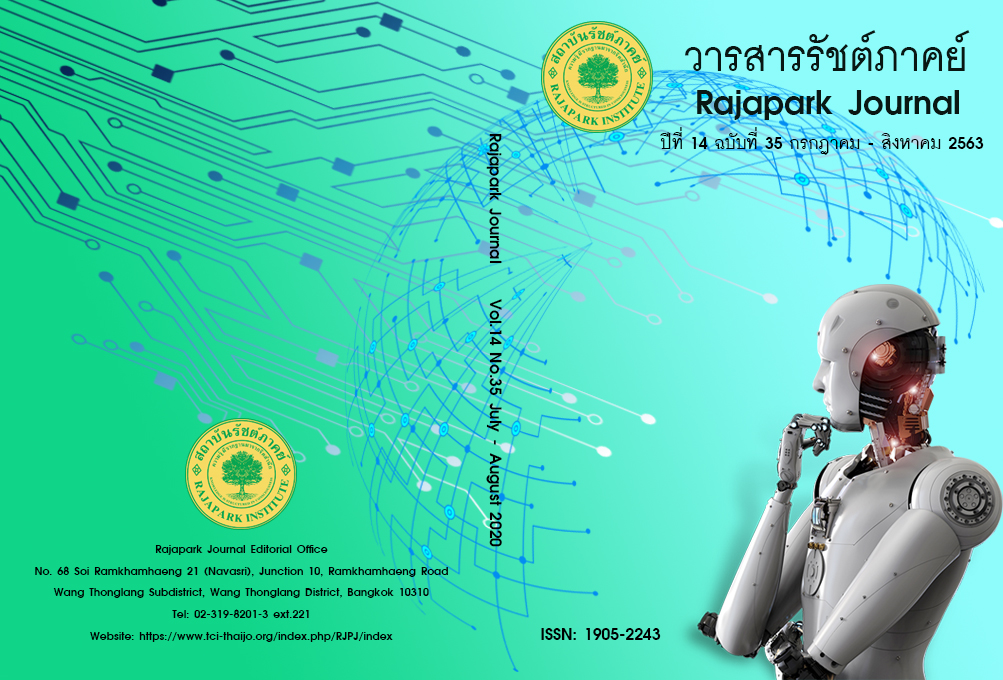Legal Measures for The Promotion of Carbon Credit Sales
Main Article Content
Abstract
The purposes of this study were as follows: (1) to explore general principles underlying carbon credit sales as well as attempts made by the public sector in the promotion of such sales; (2) to investigate foreign laws as well as international law concerning carbon credit sales and provide a critical discussion of legal problems surrounding measures for the promotion of carbon credit sales in Thailand; and (3) to recommend a correct and appropriate approach to the preparation or amendment of legislation on these matters. The study was a documentary qualitative research and, for this purpose, Thai law is analysed in comparison with the laws of other jurisdictions including the law of India and the law of Australia. The results of the study were as follows: (1) Exemption of income tax on net profits derived from carbon credit sales remains deficient as the exemption applies only to juristic persons and does not extend to natural persons as well. Also, the conditions for eligibility for such income tax exemption appear to be very restrictive prescribed. (2) There has been a misinterpretation of law concerning the collection of value added tax on carbon credit sales. (3) An overlap of the application of law has been envisioned in relation to income tax exemption under the Revenue Code and the Investment Promotion Act, B.E. 2520 (1977) in respect of carbon credit sales. and (4) Individual investors are faced with certain hindrances to their investment through the purchase of investment units in a Carbon Credit Fund. It is, therefore, recommended that amendment of law should be put forth in several aspects. To this end, legal rules which reveal duplication or misconceptions in legislation currently in force need to be eviscerated.
Article Details
Views and opinions appearing in the Journal it is the responsibility of the author of the article, and does not constitute the view and responsibility of the editorial team.
References
Deatherage, S. D. (2011). Carbon Trading Law and Practice. New York: Oxford University.
Energy Policy and Planning Office, Ministry of Energy. (2016). United Nations Framework Convention (UNFCCC). Retrieved May 10, 2020, from http://www.eppo.go.th/index.php/th/plan-Policy/climatechange/unitednation/unfccc
Freestone, D., & Streck, C. (2009). Legal Aspects of Carbon Trading Kyoto, Copenhagen and beyond. New York: Oxford University.
Kongkruepan, A. et al. (2016). Law and Climate Change. Bangkok: Duentula.
Mamout, A. (2019). Property law: Basic knowledge of ideas General principles and general Chapters (3rd ed.). Bangkok: Winyuchon.
Santisukkasaem, U. (2008). Gold Standard: Premium Carbon Credit. Green Business Journal, 3(3). 25–26.
Sirilerkwipas, S. (2015). Thailand Possibility to Become a Party to the Paris Agreement 2015. A Thesis for Degree of Master of Laws. Faculty of Law, Thammasat University.
Sumawong, K. et al. (2017). The study of Tax incentives and laws for Green Businesses. Retrieved May 14, 2020, from http://www2.fpo.go.th/e_research/show2.php?id=71
Thailand Greenhouse Gas Management Organization. (2013). CDM–Programme of Activities (PoA). Bangkok: Thailand Greenhouse Gas Management Organization.
Thailand Greenhouse Gas Management Organization. (2016a). Emission Trading Scheme ETS (2nd ed.). Bangkok: Thailand Greenhouse Gas Management Organization.
Thailand Greenhouse Gas Management Organization. (2016b). Price Mechanism to Reduce Global Warming Emission Trading Scheme: ETS. Bangkok: Afro Ape.
Thailand Greenhouse Gas Management Organization. (2019). Fight with Carbon Market (3rd ed.). Bangkok: Thailand Greenhouse Gas Management Organization.


